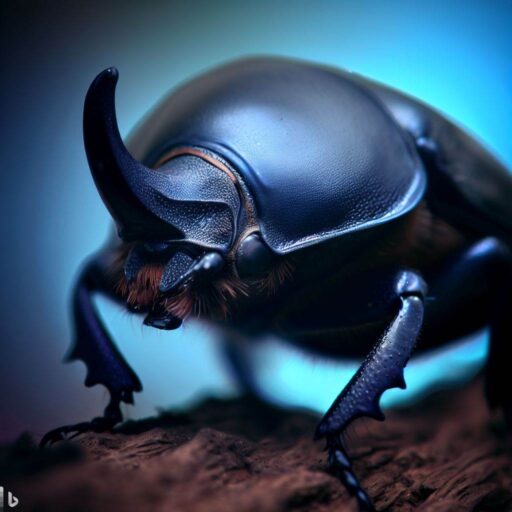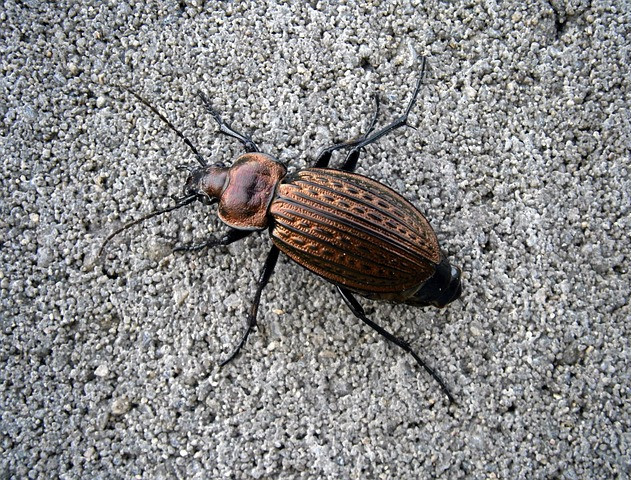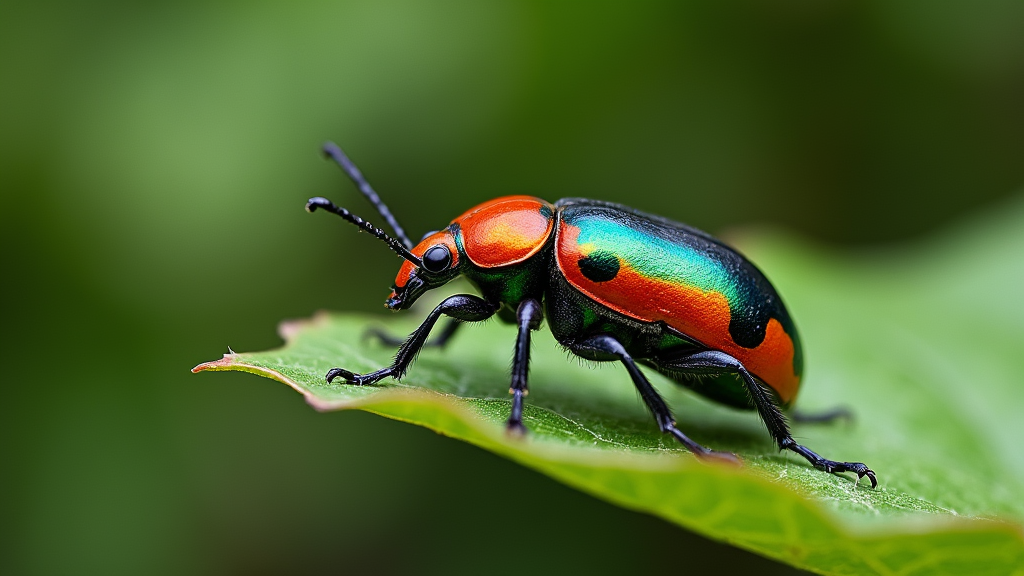What Do Ground Beetles Eat
.jpg)
- Ground beetles are predators: Ground beetles have a feeding behavior that involves preying on other insects. This makes them beneficial in controlling pests and weeds in agriculture and gardens.
- Ground beetles consume a variety of insects: Ground beetles have a diverse diet and feed on various types of insects. This helps to maintain a balance in the ecosystem and contributes to pest management.
- Ground beetles enhance pest control: By attracting and supporting ground beetles through suitable habitats and organic farming practices, farmers and gardeners can enhance the activity of ground beetles as natural pest suppressors.
Ground beetles, known for their voracious appetites and fascinating life cycle, are intriguing creatures worth exploring.
In this article, we delve into the description of ground beetles and their fascinating lifecycle.
Discover their diet, behavior, and the stages they undergo from egg to adulthood. Prepare to be amazed by the incredible world of these remarkable insects.
Description of Ground Beetles

Ground beetles are an important type of insect in ecosystems. They hunt other insects and pests which can harm crops and plants.
They like areas with dense vegetation, or organic farming practices.
Characteristics:
- Small, elongated body with hard exoskeleton
- Range from 1/8 inch to 1 inch in length
- Black or dark brown
- Some species have wings, and some don’t
- Long antennae for sensing prey and environment
These bugs inhabit various habitats, like grasslands and forests. They hunt at night, and go through a complete metamorphosis from egg to adult.
For centuries, ground beetles have been valued for their role in controlling pests without using chemicals.
Now, we understand even more about the importance of their role in maintaining a healthy ecosystem.
Lifecycle of Ground Beetles
Ground beetles have a fascinating lifecycle, with various stages of development. From eggs to larvae to adult beetles, they undergo many transformations.
A table can show the lifecycle:
| Lifecycle Stage | Description |
|---|---|
| Eggs | Laid in soil or debris for protection. |
| Larvae | Hatch from eggs, grow quickly by consuming insects and small creatures. |
| Pupae | Metamorphose into adults. |
| Adult Beetles | Hardened wings and exoskeletons; hunt a wide variety of insects. |
In each phase, ground beetles also have specific behaviors. They lay eggs in soil or debris. Larvae hunt for prey as they feed. And pupae transform into adults.
As adults, they become active predators, controlling insect populations.
To support ground beetle populations in agricultural areas or gardens:
- Create suitable habitats with mulch and diverse ground covers.
- Follow organic farming practices, avoiding pesticides that harm the beetles.
By welcoming ground beetles and avoiding pesticides, agricultural and garden areas can benefit from their pest control abilities.
Feeding Behavior of Ground Beetles
Ground beetles play a crucial role in maintaining ecological balance by controlling pests and weeds.
In this section, we will explore their feeding behavior, focusing on their role as predators, the variety of insects they consume, and their effectiveness as weed control agents.
Discover the fascinating world of ground beetles and their vital contributions to our ecosystem.
Ground Beetles as Predators
Ground beetles are impressive predators! They play an important role in natural pest control. Beetles have varied diets and feast on various insects.
They help reduce pest populations and crop damage. Beetles consume large numbers of pests, keeping insect populations balanced in ecosystems.

These predators have been seen eating slugs, snails, caterpillars, grubs, aphids, and more.
By targeting these pests, ground beetles help control pests without chemicals.
They also control weeds by eating weed seeds and seedlings, stopping the spread of invasive plants.
Ground beetles are also indicators of environmental health. They show changes in habitats and pesticide use.
By creating habitats for these predators, pest suppression and ecological well-being can be achieved.
In conclusion, ground beetles are great predators.
They eat a wide range of pests, suppress pest populations naturally, and help with weed control.
Knowing their behavior and role is key to using them in sustainable agricultural practices and promoting beneficial insect populations in gardens.
Variety of Insects Consumed by Ground Beetles

Ground Beetles are known for their diverse diet.
| Insect Species | Habitats | Frequency of Consumption |
|---|---|---|
| Ants | Various habitats (e.g., soil, trees, nests) | Varies based on availability |
| Aphids | Found on plants and vegetation | Varies based on infestation levels |
| Caterpillars | Vegetation, trees, and gardens | Varies based on caterpillar species and abundance |
| Grasshoppers | Open grassy areas, meadows, fields | Varies based on grasshopper population |
| Weevils | Plants, crops, stored grains | Varies based on weevil species and availability |
| Slugs | Moist areas, gardens, under rocks/logs | Varies based on slug population |
| Snails | Moist areas, gardens, under rocks/logs | Varies based on snail population |
| Spiders | Webs, vegetation, crevices | Varies based on spider size and species |
| Other arthropods | Varied habitats depending on specific arthropod | Varies based on arthropod type and availability |
This wide variety of prey makes them great predators. Attracting ground beetles to our ecosystems means they can help with natural pest control.
Organic farming practices create suitable habitats for them, increasing their activity and effectiveness in managing pests.
All in all, the insects eaten by ground beetles demonstrate their value for agriculture and gardens.
Ground Beetles can even be used as weed control agents. These small beetles have a big appetite for troublesome weeds.
Ground Beetles as Weed Control Agents
Ground beetles are natural predators and they help with pest management. They eat a variety of insects, including ones that damage crops and plants.
By consuming weeds and their seeds, they help reduce weed populations and stop them from spreading in gardens and farms.
This bio control reduces the need for chemical pesticides and encourages sustainable farming.
Ground beetles also help with weed control by eating weed seeds. This stops them from germinating and growing into plants.
This makes ground beetles effective at reducing weed infestations and promoting healthy vegetation in gardens and farms.
A study found that having these beetles in agricultural areas reduced weed seed banks compared to areas without them.
This research shows the important role of ground beetles as weed control agents and emphasizes the need to protect them in agroecosystems.
Benefits of Ground Beetles in Agriculture and Gardens
Ground beetles play a crucial role in agriculture and gardens by serving as effective pest managers and natural pest suppressors.
Discover how these fascinating insects contribute to pest management and help maintain the health and balance of our crops and gardens.
Pest Management with Ground Beetles
Ground beetles are beneficial for pest management. They feast on a range of pests, such as aphids, caterpillars, slugs, and snails, which helps suppress their populations and reduce damage to crops and gardens.
Their high consumption rate makes them invaluable in managing infestations.
Moreover, ground beetles offer additional advantages to agriculture and gardens.
Their large appetite for pests lessens the need for synthetic pesticides, encouraging environmentally friendly farming.
To attract ground beetles and boost their activity in controlling pests, farmers and gardeners should create suitable habitats for them, like providing leaf litter, logs, or rock piles.
Furthermore, organic farming practices help ground beetle populations.
By avoiding the use of chemical pesticides and fertilizers, farmers create an environment that is conducive to their presence.
Ground Beetles as Natural Pest Suppressors
Ground beetles are amazing natural pest suppressors.
They feed on pests like slugs, aphids, caterpillars, and root maggots.
This helps reduce the damage caused by these harmful insects.
Plus, ground beetles can control weed populations by eating weed seeds!
Without having to use harmful pesticides, they provide a great, environmentally friendly option.
To attract ground beetles to your agricultural or garden setting, there are a few tips.
Create suitable habitats like mulch or grassy areas and try organic farming practices. Avoid chemical pesticides that may hurt them.
So, get ready for the beetle buffet! Watch those ground beetles devour all those pesky pests!
Tips for Attracting and Supporting Ground Beetles
Ground beetles play a crucial role in maintaining a healthy ecosystem, and attracting them to your area can provide several benefits.
In this section, we’ll explore effective ways to create a suitable habitat for ground beetles, as well as how organic farming practices can enhance their activity.
Discover how these simple tips can help you foster a thriving environment for these beneficial insects.
Creating Suitable Habitat for Ground Beetles
Ground beetles are key for pest management. To ensure they thrive and control pests, a suitable habitat must be created. Three points to consider:
- Provide shelter: Ground beetles need places to hide during the day, like rocks, logs, and mulch. This gives them dark, moist spaces and protects them from predators.
- Ensure food availability: Ground beetles eat insects, so a diverse insect population must be maintained in the habitat. Plant diverse species to attract different types of insects, and cut back on pesticides which can harm beneficial insects.
- Minimize disruptive factors: Ground beetles are sensitive to disturbances like light and noise. Low-intensity lighting and shaded areas will encourage ground beetle presence.
These organic farming practices let ground beetles do the dirty work of pest control. They consume weed seeds, reducing weed populations without herbicides.
So go green and support ground beetles!
Using Organic Farming Practices to Enhance Ground Beetle Activity
Organic farming practices can help ground beetle activity. They are predators of pests that damage crops and gardens.
This makes them valuable in controlling pest populations naturally. Farmers can attract ground beetles to their farms by avoiding synthetic chemical pesticides.
Organic farming has many benefits for ground beetle activity. They play a role in natural pest suppression.
By using organic farming methods, farmers can reduce the reliance on conventional pest control methods. This protects the environment and promotes ecological balance.
To create a suitable habitat for ground beetles, farmers should incorporate features like vegetation cover, mulch, and diverse plant species into their farms.
This provides shelter and food for ground beetles, increasing their presence and effectiveness.
Sustainable agriculture techniques, such as crop rotation and cover cropping, support biodiversity and support ground beetle activity.
One farmer had great success with organic farming practices. He eliminated chemical pesticides and noticed an increase in ground beetle populations.
This reduced pest damage to his crops without compromising yield or quality. This is an example of the potential impact of organic farming practices to enhance ground beetle activity.
Conclusion
Ground beetles are amazing! They feast on an array of food, like caterpillars, aphids, and beetles.
Plus, slugs, snails, and earthworms! They’ll even eat dead animals and some plants.
This adaptability is why they’re successful predators in so many habitats.
Ground beetles are especially important for controlling pests. By eating insects and other invertebrates, they keep ecosystems in balance.
This helps farmers and gardeners, since they don’t need as many chemical pesticides.
Different ground beetle species may have different diets.
It depends on where they live and what plants they can find. Some prefer certain types of prey or habitats, while others will eat whatever they can find.
Ground beetles are an essential part of ecology. Their consumption of all kinds of prey helps maintain biodiversity.
To protect them, we must learn more about their feeding habits. Then we can help them keep ecosystems in balance.
Some Facts About What Ground Beetles Eat:
- ✅ Ground beetles are voracious predators that consume up to their body weight in prey each day.
- ✅ They feed on a variety of insects, including wireworms, maggots, ants, aphids, caterpillars, and beetle larvae.
- ✅ Some ground beetle species also feed on weed seeds, contributing to weed control.
- ✅ Ground beetle larvae burrow in the soil and feed on pests, such as other insects and plant seeds.
- ✅ They are opportunistic feeders and find their food through random searches, making them tenacious generalist predators.
FAQ
What do ground beetles eat?
Ground beetles are opportunistic feeders, consuming a wide range of prey insects such as wireworms, maggots, ants, aphids, caterpillars, and beetle larvae.
Some species also feed on weed seeds, providing additional benefits in reducing weed populations.
Do ground beetles eat agricultural pests?
Yes, ground beetles are voracious predators and play a major role in reducing insect pests in agricultural fields.
They are known to feed on a variety of pests, including aphids, moth larvae, beetle larvae, and mites.
Some ground beetle species specialize in feeding on specific pests, like the Colorado potato beetle.
What are some examples of insect pests that ground beetles control?
Ground beetles are effective in controlling a wide range of insect pests such as aphids, caterpillars, wireworms, and beetle larvae.
They also prey on pests like the Colorado potato beetle, which can be damaging to crops.
Do ground beetles eat weed seeds?
Yes, ground beetles are opportunistic feeders and consume weed seeds as part of their diet.
This helps in reducing weed populations in agricultural fields and gardens.
Can ground beetles become a nuisance pest indoors?
Although ground beetles occasionally find their way indoors, they do not feed or reproduce indoors.
If found inside, they should be captured and returned outside rather than being managed as pests.
They are considered beneficial insects for their role in natural pest control.
How do ground beetles contribute to reducing weeds in agricultural fields?
Ground beetles play a significant role in reducing weed populations through their feeding habits.
They not only feed on weed seeds, but also consume the insects that may aid in weed growth or spread.
This biological control helps in managing weeds in agricultural fields and maintaining the health of crops.





Leave a Reply